
Sushil Sharma, a youth Congress leader who made headlines for one of the most chilling murders Delhi has ever witnessed, was today ordered to be freed immediately by the Delhi High Court. Sharma had on the night of July 2, 1995, in a fit of anger, murdered his wife Naina Sahni, chopped her body to pieces and dumped them into the tandoor of a popular restaurant. The court said he should be released because he had served the maximum sentence for his crime, in what came to be known as the 'Tandoor Murder Case'.
Before committing the crime, Sharma was enraged after learning about his wife's friendship with another man, Matloob Karim, and suspected them of having an extra-marital affair.
Policemen who were patrolling the area, saw thick smoke coming from the tandoor and found Naina Sahni's dismembered, half-burnt body. Sharma had escaped the scene but was arrested after a week.
Delhi Police filed charges against him twenty days after the crime, on July 27, 1995. The first autopsy of Naina Sahni, conducted at Lady Hardinge Medical College, was misleading, as it said Sahni's death was caused by burn injuries.

Tandoor Murder Case: A second autopsy showed two bullets were lodged in Naina Sahni's body, one in the head and the other in her neck. Sushil Sharma had killed her, chopped her to pieces and then dumped the pieces into the tandoor of a popular Delhi restaurant
A second autopsy, carried out after orders from Delhi's Lieutenant Governor, changed the entire direction of the case. The post-mortem report, submitted by doctors from three different hospitals, led to a lower court sentencing Sharma to death. It showed two bullets lodged in Naina Sahni's body, one in the head and one in her neck.
Sharma appealed against the lower court verdict in the Delhi High Court but received a setback as the High Court upheld the lower court's death sentence. He then appealed to the Supreme Court, which upheld his conviction, but commuted his death sentence to life in October 8, 2013.
The top court's reasoning for remitting the death sentence was that Sharma did not commit a crime against society. It said in its judgement, that Sharma killed Naina Sahni because he shared a strained relationship with her. Hence Sharma's crime did not fall in the 'rarest of rare' category.

Tandoor Murder Case: The Delhi High Court thus argued against the Review Board's declaration today, saying, "The Sentence Review Board (SRB) cannot say no no this murder was brutal, so we will not release him."
Sharma, now 56, requested the Delhi High Court to release him as he had been in jail since 1995. In his petition, Sharma said he already served the maximum prescribed sentence.
The Delhi government's Sentence Review Board (SRB) had earlier this year, rejected his request, along with the requests of a hundred other prisoners.
The Delhi High Court thus argued against the Review Board's declaration today, saying, "The Sentence Review Board (SRB) cannot say no no this murder was brutal, so we will not release him. He is incarcerated for over 25 years including remission. Does it not infringe upon his human rights, which are inalienable rights."
Track Latest News Live on NDTV.com and get news updates from India and around the world

